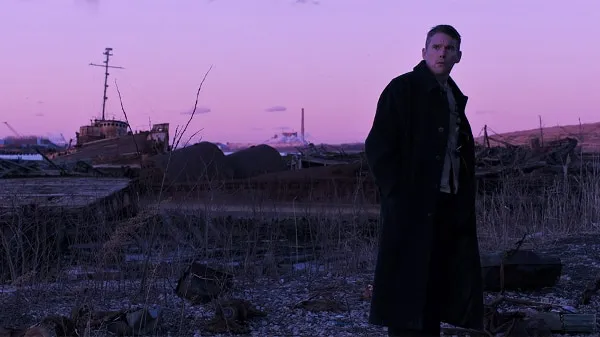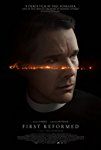Eye For Film >> Movies >> First Reformed (2017) Film Review
First Reformed
Reviewed by: Owen Van Spall

Ethan Hawke cuts a looming, flinty-eyed and tormented figure as a disillusioned and possibly unstable upstate New York Reverend, in Paul Schrader’s austere but ultimately mesmerising character study. First Reformed, which refers to the name of a church in the film whilst obviously also lending itself to other interpretations, doesn’t attempt to hide its debt to Schrader’s acclaimed screenplays including Taxi Driver and Raging Bull. Beyond being another study of another of ‘God’s lonely men’, of the narcissism of those who feel they are the only ones who can sense and purge the sickness running amok in the world, this film even mimics certain shots from Taxi Driver in ways anyone beyond vaguely familiar with that Scorsese/DeNiro milestone will recognise right away. Thanks to Hawke’s commanding soul-in-torment performance, striking cinematography and production design, and a different setting, which allows for connections to more modern concerns about radicalisation, First Reformed ends up being a satisfying meditative echo rather than a simple replay of Schrader greats. I have heard also that there is much love for Bresson laced throughout the work, but I’ve not seen the film, Diary Of A Country Priest, that many are pointing to.
A grizzled and taut Ethan Hawke (who it is tempting to think was cast so we would cringe at how far young Jessie from Before Sunrise has come) plays the ominously-named Father Toller, a late 40s divorcee literally living out the meaning of his name in an upstate New York Dutch colonial-style church called First Reformed. Like DeNiro’s disturbed loner from Taxi Driver, Travis Bickle, Toller finds little to no sleep at night, and keeps a daily diary which we hear in voiceover. That voiceover, scattered with biblical references and unending lists of daily slights, reveals a man unable to follow the same homilies he dispenses to his much-reduced flock.

“Wisdom,” Toller tells one young man who calls on him, “is holding two contradictory truths in our minds simultaneously.” Yet Toller, burning through a bottle of whiskey a night with a Pepto-Bismol chaser, is not able to perform the same mental gymnastics that we all do on a daily basis to get past such competing truths and carry on - such as accepting we are going to die yet knowing that that the law says that doesn’t give us license to act like we are unleashed from any responsibility. Or knowing that despite being given evidence of the dire state of the world and our own personal circumstances, it could also be true that things could get better tomorrow. We all, usually, find ways to compromise and carry on. But, bitter at the fact that the church he oversees attracts fewer and fewer followers, resentful of the timidity with which the pastor of the larger, corporate-backed church that owns First Reformed displays when he starts nudging towards speaking on political issues, and frustrated by the unyielding extremist positions that his young church group volunteers take, Toller is a man slowly twisting himself further and further inwards at the sense of his own uselessness. And people like that, both the movies and real life tell us, can explode outwards.
Schrader seems to take a perverse delight in taking us through the daily indignities that Toller perceives as his day-to-day fate. Pastor Jeffers (Cedric Kyles, also known as Cedric the Entertainer) over at the parent church Abundant Life, a modern megachurch par excellence, insults him when he chides Toller for not living in the real world. “You’re always in the garden, even Jesus got out of the garden”, he tries to joke with the stony-faced reverend. When dining in the cafeteria of Abundant Life, Toller is surrounded by wall-mounted quotes from the scriptures that, thanks to the garish design and bizarrely large fonts, end up looking like tacky corporate advertising. The industrialist who bankrolls Abundant Life is a total asshole promotes anti-climate change myths and who clearly wants no political involvement from the ministers. Visitors to the First Reformed, when it is open for weekend tours, seem more interested in getting the right size of tee in the gift shop than in the fact that it is due to celebrate its 250th anniversary.
It seems Toller might be doomed to endure death by a thousand cuts for eternity, but an inciting incident fires something up inside him. Though unable to prevent the suicide of a local eco-activist (a convincing display of desperation from actor Philip Ettinger) who called on him in despair the week before, Toller seems to absorb wholesale his statistic-laden diatribes about corporate malfeasance and political corruption ensuring certain global doom. Here, it seems, is something he can grasp on to; an identifiable nexus point where a politically ignorant and corporate-dominated church is failing to rise to a basic challenge: “will God forgive us for what we do?”
However, even as Hawke’s character starts down a disturbing path in order to shake the church and the wider world awake, one that engages fully with the modern reality of how the internet can provide all the material a budding extremist needs to affirm their beliefs (austere figure he may be, but Toller maintains a nifty laptop and solid broadband), Schrader keeps his motives interestingly ambiguous. For a man of the cloth, Toller seems to be growing worryingly close to the activist’s widow (Amanda Seyfreid, good, but underused). Is it worth pointing out that the widow is with child and that her name is Mary, too? Is it a sexual attraction? Then there is the fact that this man is booze-addled much of the time, and his stubborn refusal to heed Jeffers’s advice to get his deteriorating health checked out raises the possibility of a refusal to face a wasting illness. His son is revealed to have died in the second Iraq War also; a pointless death in an unjust war. All of these nuggets of backstory and behaviour challenge the purity of his new-found environmental drive, in much the same way many have theorised that Travis Bickle’s ‘manifesto’ and onscreen actions in Taxi Driver could in fact be a delusion linked to PTSD resulting from his Vietnam War service (assuming, of course, that he did serve as he declared).
Though it eventually arrives at a place of what I can only call transcendental madness, Schrader’s film mostly betrays a suitably severe aesthetic. The film is shot in an ‘older’ 4:3 ratio, which makes everything looked hemmed in and tense. The First Reformed Church in Snowbridge, upstate New York is a stern, looming 18th-century box of white wood with a steeple raised to a heaven offering no answers. Toller’s room inside has little furniture, and looks hardly changed from decades ago. The effect is to make the Reverend look like he’d be more at home in the actual time period the church was built, free of the compromises a global economy demands. The world outside offers no cheer, being one of permanently grey skies and spidery trees. Schrader’s film, unless you interpret the loopy ending in a very positive way, offers no cheer or answers either. But what is does offer is plenty of food for thought, and one of Ethan Hawke’s best performances.
Reviewed on: 05 Jun 2018


















